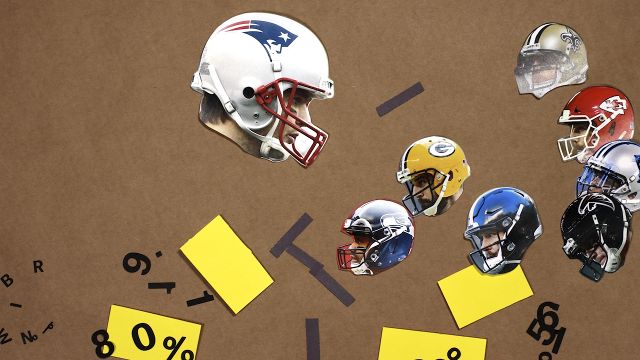When you’re playing the Patriots in the postseason, there is no comfort in win probability. New England is vying for its sixth Super Bowl championship courtesy of another double-digit fourth-quarter comeback — this time against the league-leading Jacksonville defense. And the Patriots are defending the title they won against impossible odds in coming back from 25 points down against the Falcons — including a 19-point deficit in the fourth quarter.

It’s gotten to the point where the only thing worse than falling behind early to the Patriots is having a big lead late, when Tom Brady turns into Captain Comeback. But while football fans and opponents may expect miracle rebounds, this is only a recent transformation by arguably the greatest quarterback of all time. Through 2013 in both the regular season and the playoffs, Brady’s ability to lead the Patriots back from a fourth-quarter deficit of up to two scores was nothing special.
In the regular season from 2001 through 2013, Brady had an 83.8 passer rating and 6.95 yards per attempt when trailing by up to two scores in the fourth quarter. That compares with the league average of 74.8 and 6.72, meaning that Brady was good relative to average in these situations but certainly nothing superhuman.
In the postseason during that same period — when the Patriots went 18-8, including 9-8 from 2005 through 2013 — Brady was subpar when trailing late by some key measures. His rating was 66.6 with a paltry 5.57 yards per attempt. (NFL postseason averages in the period were 73.4 and 7.17.) The magic we have seen recently simply wasn’t there. Take New England’s most infamous loss: the 18-0 team that was stunned by the New York Giants in Super Bowl XLII. After Eli Manning connected with Plaxico Burress for the eventual game-winning touchdown, the Patriots still received the ball with roughly 30 seconds and all three timeouts, needing only 35 or so yards to get into Stephen Gostkowski’s range for a game-tying kick. If that exact scenario unfolded this season, would anyone be surprised if Brady were able to steer his team across midfield? Of course, on that February 2008 day, he threw three incompletions and took a back-breaking sack.
But since the start of the 2014 postseason, something has clicked inside Brady. The Patriots rallied past the Ravens in the fourth quarter of the divisional round that year when Brady tossed a 25-yard TD to Brandon LaFell with less than six minutes left. And in Super Bowl XLIX, Seattle led 24-14 in the fourth — and had a 94 percent win probability after the Patriots punted at the start of the fourth quarter — before Brady connected on consecutive touchdowns to Danny Amendola and Julian Edelman. (Sure, Malcolm Butler’s game-sealing interception helped.) Including these two games, the Patriots have a 4-1 postseason record when trailing by up to two scores in the fourth since 2014. Brady is quite simply carrying them on his back with supernatural efficiency, even with defenses knowing he has to pass on nearly every play — posting 7.97 yards per attempt vs. the 6.99 NFL playoff average (including Brady himself) and a 123.0 passer rating compared with 82.4 for all NFL passers in this span.

Of course, it needs to be noted that Brady is helping to set the stage for his playoff comebacks by playing rather ordinarily earlier in games. His passer rating, for example, is barely above average in the first three quarters of postseason games since 2014 — 91.7 compared with 88.2 for all QBs. It’s almost as if Brady is holding something in reserve for when it’s most needed.
How he’s finding such high-leverage ways to improve so dramatically is one of football’s greatest mysteries. The most obvious explanation is that the 40-year-old has already been in almost every scenario before and simply knows what to do. Or maybe it’s just the salmon, electrolytes, compression sleeves, 8:30 p.m. bedtime and recovery pajamas? Or is it simply that great players can express their greatness at any time and make the spectacular seem routine? Know this: If the Eagles are lucky enough to have a seemingly secure fourth-quarter lead come Super Bowl LII, no one on the Philadelphia sideline will feel safe.
Check out our latest NFL predictions.